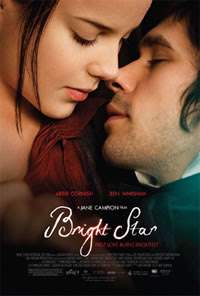 MC film critic Caryn James riffs on an unlikely strategy for bringing sexy back to the movies: Keep those clothes on.
MC film critic Caryn James riffs on an unlikely strategy for bringing sexy back to the movies: Keep those clothes on.BRIGHT STAR
In the glowing Bright Star, poet John Keats (Ben Whishaw) and his love, Fanny Brawne (Abbie Cornish), lie together on a bed, fully clothed—racy behavior in 1820 for an un-married pair—and we feel the fierce heat of their desire with nary a thrusting pelvis in sight. This sexy-yet-sexless tale of a doomed affair is a potent reminder of romance, all but vanquished by today's harshly lit, full-frontal orgies.
Director Jane Campion's most enthralling film since The Piano, Bright Star differs from standard period pieces that waltz around the idea of pure animal lust: Here, the sensitive Keats and the feisty Brawne really, really want to sleep together. But marriage is out of the question—Keats is penniless, not to mention dying of tuberculosis—and the lovelorn pair are too respectable, too proper, to go for it anyway.
Often, directors of 19th-century dramas resort to Jane Austen's adolescent totems of desire: Colin Firth in a wet shirt in the BBC classic Pride and Prejudice, a windswept Keira Knightley finally kissing her Darcy in the 2005 movie version. But Keats and Brawne are so on fire for each other—and so adult--they actually discuss having sex before he heads to Italy to convalesce. Keats ultimately declines, saying, "I have a conscience."
Instead, Keats and Brawne channel their passion into eloquent words and gestures—hey, he isn't called a Romantic for nothing. His poem "Bright Star," inspired by Brawne, imagines his head "pillow'd upon my fair love's ripening breast." Living next door to each other in attached row houses, they place their hands on opposite sides of a shared wall at night. (Aww!) The scene pulsates with a longing far more powerful than any shag ever could.
Of course, we gals know that the freedom to find out if you'll enjoy sex with your future husband is one of the greatest advances of the 20th century. But the rom-com formula for such hookups (three dates plus one lobster dinner divided by two bottles of wine) rarely adds up to flirtatious excitement. Bright Star bravely suggests that a few poetic words make for a better aphrodisiac: When Keats writes, "You have absorbed me," restraint never sounded so hot.
NETFLIX THIS!
Do the dark travails of fevered writers make for good cinema? Consider: Gwyneth Paltrow as suicidal Sylvia Plath, falling for caddish fellow poet Ted Hughes (Daniel Craig) in the ominous SYLVIA; baby-faced Leonardo DiCaprio playing the druggy poet Jim Carroll in THE BASKETBALL DIARIES; Oscar winner Nicole Kidman taking that long, lonely walk into the lake as Virginia Woolf in THE HOURS. The bright side? In WILDE, a gorgeous, pre-stardom Jude Law plays Bosie, Oscar Wilde's ruinous lover.
SYNOPSIS:
London 1818: a secret love affair begins between 23 year-old English poet, John Keats (Ben Whishaw), and the girl next door, Fanny Brawne (Abbie Cornish), an out-spoken student of high fashion. This unlikely pair begin at odds, he thinking her a stylish minx, while she was unimpressed not only by his poetry but also by literature in general.
However, when Fanny heard that Keats was nursing his seriously ill younger brother, her efforts to help touched Keats and when she asked him to teach her about poetry he agreed. The poetry soon became a romantic remedy that worked not only to sort their differences, but also to fuel an impassioned love affair.
When Fanny's alarmed mother and Keats' best friend finally awoke to their attachment, the relationship hand an unstoppable momentum. Intensely and helplessly absorbed in each other, the young lovers were swept deeply into powerful new sensations, "I have the feeling as if we're dissolving," Keats wrote to her. Together they rode a wave of romantic obsession that only deepened as their troubles mounted.
When Keats fell ill a year later, the two young lovers faced no marriage but separation. In Keats' own poignant words, "forever panting and forever young."